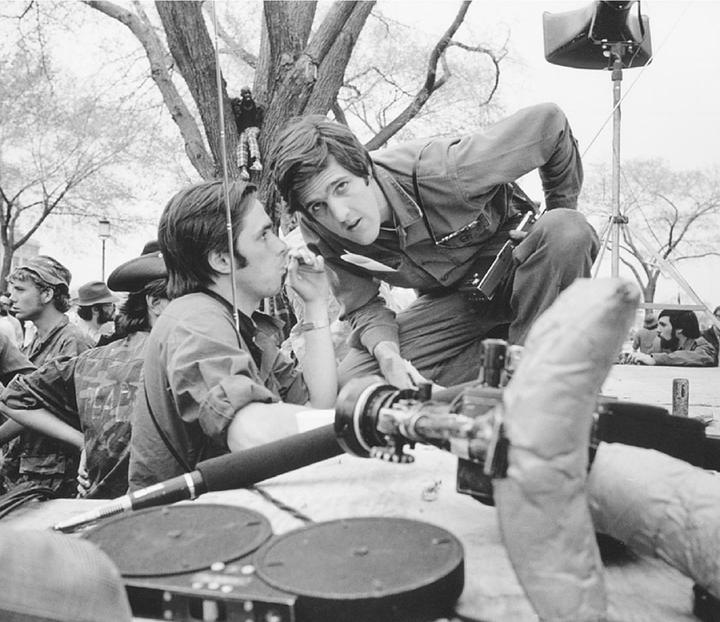There are countless moments like this one in George Butler's film Going Upriver: The Long War of John Kerry, where viewers will be forced to hold back tears.
Despite the title, though, Butler, best known as the director-producer of Pumping Iron, has created less of an encomium to Kerry (although he clearly admires the hell out of the guy), and more of an ode to one week in April 1971.
But first, Butler establishes the timeline with President Lyndon Johnson's call six years earlier for increased military engagement in Southeast Asia. Johnson's arrogant, persuasive posturing sounds eerily similar to George W. Bush's discredited or shifting reasons for invading Iraq, and you can't help wonder if the editing intentionally draws these connections. There was the promise of Vietnamese elections; there was the Cold War myth that the Vietnamese were pawns for spreading Chinese and Soviet communism. And there is the less than subtle parallel to today's Iraq reality—U.S. troops arrived thinking they were liberators, became identified as invaders, and then gradually met a guerilla resistance fighting for national independence.
Next, Butler painstakingly constructs 8mm footage from the Mekong firefights that feels like a home movie version of Apocalypse Now. Chugging through the river in 50-foot aluminum Swift boats, twin diesel engines roaring their presence from miles away, U.S. troops engaged fire daily in what, after several years, amounted to a useless war of attrition. The human costs of Kerry's time there, as well as the moral dimensions of the greater war, are summed up in a voiceover from one of Kerry's crewmen: “I didn't want to get to know about you spiritually, about your family, because tomorrow you might be gone.”
The film then turns to its primary focus: The story of soldiers coming home and presidential candidate John Kerry's subsequent role as spokesman for Vietnam Veterans Against the War.
After several days of growing protest from thousands of veterans, and with tensions mounting over the group's right to assemble on the Washington Mall after dark, on April 23, 1971, Kerry entered the Senate Foreign Relations Committee chambers in combat fatigues, proclaiming: “How do you ask a man to be the last man to die for a mistake?”
Kerry's testimony was more than that one proclamation. This moment lifted him to instant fame thanks to the evening news, and, according to Butler's selected testimonials, shifted the course of U.S. foreign policy. Like the stark footage of the young amputated soldiers returning from Iraq in Fahrenheit 9/11, you're left to wonder why this footage, in its entirety, has not made an appearance on the 24-hour cable news. If Americans want a truthful perspective, in contrast to the nightly pro-Bush campaign ads funded by Kerry's Vietnam detractors, these five minutes might easily clarify the whole matter.
Likewise, left waiting for a congressional response to Kerry's statement, the following morning, thousands of veterans awoke to find a fence constructed around the Capitol. They marched to it while a bugler played TAPS and, one by one, men dedicated their medals to friends that died in combat, tossing them over the fence onto the restricted steps. The men all wore tattered combat fatigues. One man threw his cane; a mother lobbed her son's Gold Star. These were young soldiers, in the prime of their lives whose citations symbolized their greatest achievements, sobbing, embracing each other, sharing grief, because they believed what they were doing might stop other troops from being killed. Watch this and you will see sorrow. And like so many scenes in the film, you'll not be able to choke back the tears. See this footage unravel on screen, and you're left to wonder—that is supposed to be Kerry's un-American moment?
So brace yourselves. There is still more Vietnam to come in this year's presidential campaign. And thanks to Butler's latest contribution, you will find a narrative, not infused with partisan sound bites or Michael Moore-style storytelling, but one that most importantly constructs a painful history lesson. A lesson that it seems America is hell-bent to learn a second time.



